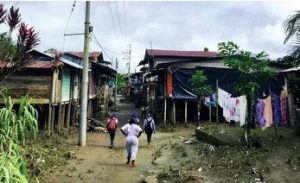FREE FLOW OF INFORMATION
An article from the Mennonite World Review
Partners of Mennonite Central Committee in Colombia continue to walk with people affected by more than 50 years of violence as new armed conflict emerges even after a peace accord.
Violence among armed groups is escalating as FARC-EP guerrillas demobilize, threatening Mennonite Brethren churches in the Chocó region.

Members of a Colombian Mennonite Brethren Conference visit a rural community in the San Juan region shortly after the community experienced significant flooding. The community is stuck in the middle of violence between the Gaitanista Self Defence Forces of Colombia, a paramilitary group that occupies the area, and a guerrilla group vying for power. — Brendah Ndagire/MCC
The country’s largest rebel group, FARC-EP — the Revolutionary Armed Forces of Colombia — signed a peace accord with the government last year. But “there is still a long journey toward peace,” said Amy Eanes, an advocacy support specialist for MCC in Colombia.
Some armed groups are becoming more active, hoping to assert dominance and claim territory once occupied by the FARC-EP.
This is especially true in rural areas of the Chocó region, where MCC partners with the Mennonite Brethren Conference, whose members are working and praying for peace.
Living in fear
A member of one of the churches, Maria Camila, whose real name isn’t being used to protect her identity, says another guerrilla group is fighting the Gaitanista Self Defence Forces of Colombia, a paramilitary group that normally occupies the area, and it’s very dangerous there now.
(Article continued in right column)
What is happening in Colombia, Is peace possible?
(Article continued from left column)
Armed conflict between the two groups broke out in February, months after the peace accord was signed by the FARC-EP. In one part of the town, the guerrilla group threatened to shoot civilians if they didn’t open their doors because the guerrilla fighters believed members of the paramilitary group were hiding there.
“Even though you know that God says that wars will come and in the midst of all these things God will protect you, it was something so terrible — to feel the shootout, to hear the sounds,” she said. “I just said, ‘Lord, have mercy on us and watch over us,’ but we thought this was going to be the end.”
Camila has never felt so unsafe. “We aren’t free to walk around at night. We all live shut in our houses,” she said. “All of us in the community are frightened. That’s why we’re living like this.”
She has little faith the peace accord will make a difference in her community or other rural areas in Colombia.
“In reality, the hope we have is from God,” she said.
Teaching peace
MCC continues to support partners in Colombia that work on peacebuilding initiatives and assist some of the most vulnerable families, particularly those displaced by violence. The conflict has resulted in 7 million internally displaced people.
In April, MCC embarked on a three-year peace-education project with the Mennonite Brethren Regional Council of Chocó to promote an understanding of a culture of peace and how to encourage peacebuilding among youth and young adults.
One of MCC’s partners, the Church Coordination for Psychosocial Action, supports churches and organizations, enabling them to provide trauma awareness and healing, build resilience and contribute to peacebuilding and reconciliation in Colombia.
MCC works with a number of Mennonite churches and organizations in Colombia who have been actors for peace for many years.
“The churches are figuring out what this post-accord period will look like for them, and I think it’s important to walk alongside these partners,” Eanes said.